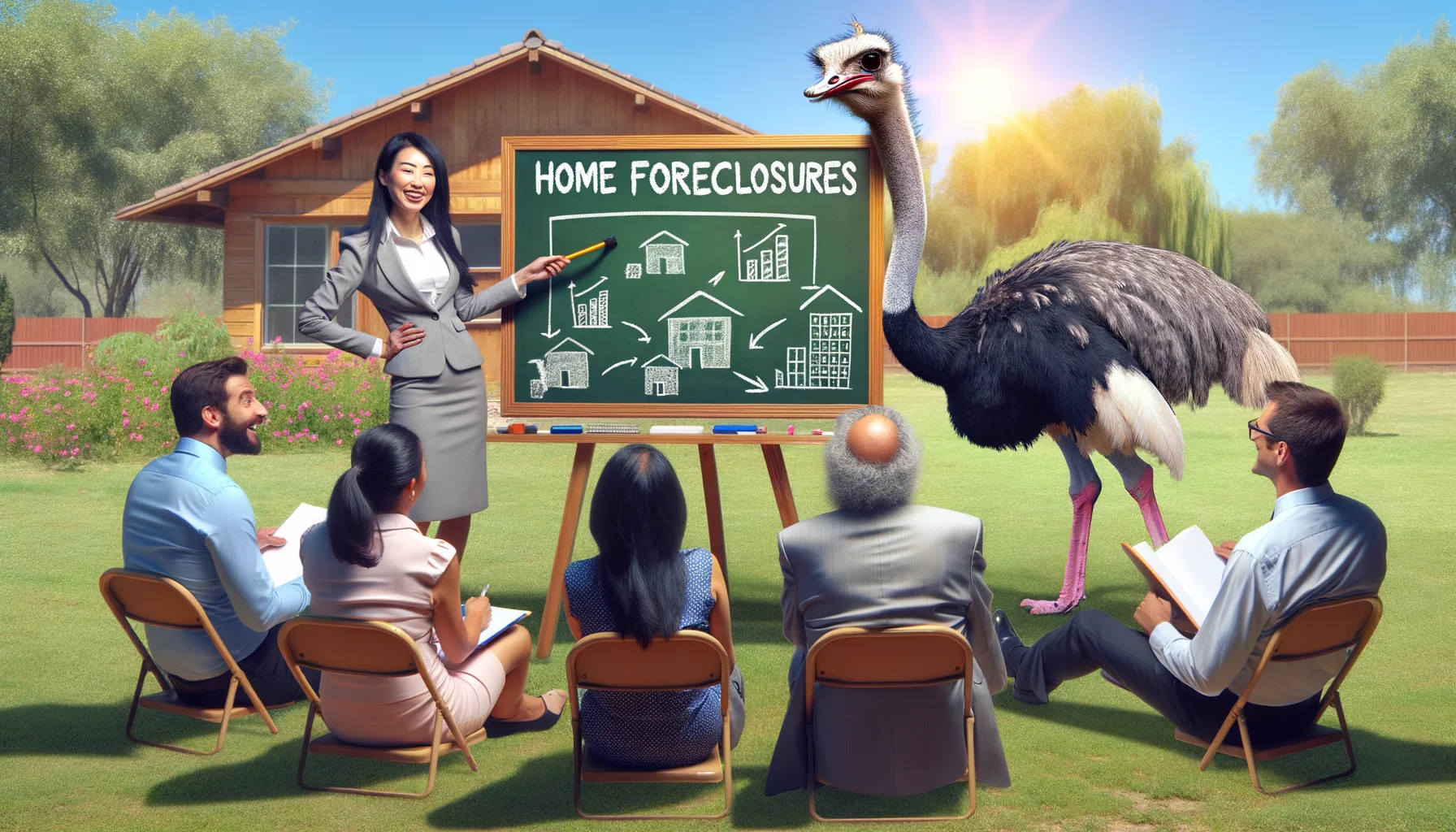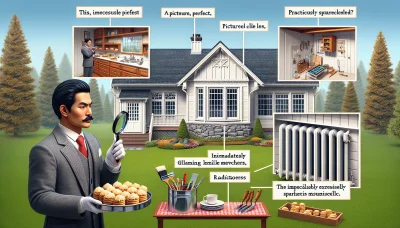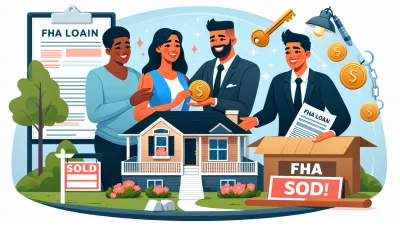Understanding Home Foreclosures Quiz
Test Your Knowledge
Question of
What is a Home Foreclosure?
Get ready to dive deep into the world of home foreclosures! This isn't just about losing a home; it's about understanding the critical financial implications that can change lives. A home foreclosure is what happens when a homeowner fails to pay their mortgage payments, and the lender takes action to repossess the property. Its a legal process that allows the lender to recover the amount owed on a defaulted loan by selling or taking ownership of the property.
Foreclosure is a term that sends shivers down the spines of homeowners everywhere. It represents not just a financial crisis but also the potential loss of a family's cherished home. But it's essential to grasp this concept because knowledge is power, and understanding foreclosure can help you navigate or even avoid this daunting situation. Foreclosures can happen with any mortgage product, be it an adjustable-rate mortgage, an interest-only mortgage, or even a fixed-rate mortgage. The key takeaway here is that foreclosure is not selective; it can affect anyone who falls behind on their mortgage payments.
Now, let's talk about why foreclosures occur. They typically result from borrowers being unable to meet their loan obligations, perhaps due to financial hardships such as unemployment, divorce, or medical emergencies. Other times, it could be due to poor financial management. Whatever the cause, when those monthly payments aren't made, the foreclosure clock starts ticking!
The Foreclosure Process
Initial Missed Payments
Attention all homeowners! The first step in the foreclosure process begins when you miss your first payment yes, just one payment! Lenders usually offer a grace period; however, once that period expires and you havent paid up, youll find yourself on slippery ground. After consecutive missed payments, lenders will issue a warning and eventually move towards initiating the foreclosure process.
It's crucial to understand that during this initial phase, communication with your lender can be vital. Many lenders are willing to work out payment plans or offer forbearance agreements if they're approached early enough. Don't wait until it's too latereach out and explore your options!
Notice of Default
The Notice of Default is like an alarm bellit signals serious trouble ahead! This legal document is filed by the lender and marks the formal beginning of the foreclosure process. Once you receive this notice, time is of the essence! You typically have a period (which varies by state) to either settle your debts or negotiate with your lender before they proceed with selling your property.
- Act swiftly: The Notice of Default means business; don't ignore it!
- Legal advice: Consider getting legal help immediately to understand your rights and options.
- Negotiation: This may be your last chance to negotiate with your lender for alternative arrangements.
Legal Implications of Foreclosure
Judicial vs. Non-Judicial Foreclosure
This is where things get technicalbut stay with me! In some states, foreclosures go through the court system; this is known as judicial foreclosure. Here, lenders must file suit in court and prove they have grounds for foreclosure. On the flip side, non-judicial foreclosures allow lenders to bypass courts provided they follow state-specific procedures outlined in mortgage agreements.
Judicial foreclosures can provide homeowners with additional time to contest or delay proceedingsthis could be crucial in turning things around! Non-judicial foreclosures tend to be faster but may leave less room for borrowers to challenge the process.
Deficiency Judgments
Buckle up because deficiency judgments are another critical aspect of foreclosures! If your home sells for less than what you owe on your mortgage at auction (yes, we'll get into auctions soon), lenders might pursue a deficiency judgment against you for the remaining amount. This means not only could you lose your home but also face additional financial liabilitiesthis is serious stuff!
In some cases thoughand heres some good newsstates have anti-deficiency statutes that may protect borrowers from these judgments under certain conditions. Knowing whether these laws apply to you could save you from further financial distress post-foreclosure.
Types of Foreclosures
Pre-Foreclosure
The pre-foreclosure stage presents an opportunitya chance for homeowners to halt the full-blown foreclosure process in its tracks! During this period after the Notice of Default has been issued but before actual foreclosure proceedings begin, homeowners might sell their property or pay off their debt.
This phase provides a window where savvy investors often swoop in looking for deals by purchasing distressed properties below market value. For homeowners facing foreclosure threats, pre-foreclosure sales can be a lifelinea way out that avoids further credit damage and potential legal issues associated with full foreclosures.
Auction
Auctions are where foreclosed homes hit center stage! If efforts during pre-foreclosure fall through, properties are auctioned off to the highest bidder in public sales managed by local courts or sheriffs' offices. These auctions represent an incredible opportunity for buyers looking for real estate deals while providing lenders a chance to recoup losses from defaulted loans.
Auctions can be fast-paced and competitive environments where cash is kingbuyers must be prepared with funds at hand and ready for quick transactions. For homeowners previously unable to resolve their debts during pre-foreclosure stages, auctions mark the endgamean event that finalizes their loss of property ownership.
Causes of Home Foreclosures
Financial Hardships
Let's dive right into the thick of things! Financial hardships are a MAJOR player in the realm of home foreclosures. When life throws a curveball, like a job loss, it's not just an inconvenienceit's a full-blown crisis for your financial stability! Suddenly, that monthly mortgage payment looks like a mountain instead of a molehill. And it's not just about losing your job; it's about the domino effect that follows. Without that steady income, keeping up with the mortgage payments becomes an uphill battle!
And if you think that's all, think again! Unexpected expenses are like uninvited guests at the worst possible time. Medical emergencies, critical home repairs, or even a car breakdown can drain your savings faster than you can say "foreclosure." It's these unforeseen costs that can push homeowners to the brink, forcing them to choose between essential needs and their home. It's a precarious balancing act that too many find impossible to maintain.
Adjustable-Rate Mortgages (ARMs)
Now, let's shift gears to Adjustable-Rate Mortgages (ARMs)! These financial instruments can be ticking time bombs for unsuspecting homeowners. Initially, ARMs lure you in with low introductory rates, but don't be fooled! The real game begins when interest rates reset. That's when the monthly payments can skyrocket without warninga phenomenon known as payment shock. And let me tell you, it hits like a ton of bricks!
You need to understand this: Payment shock isn't just a fancy term; it's the harsh reality for many when their budget is blown out of the water by new mortgage rates they never saw coming. This can lead to missed payments and ultimatelyyou guessed itforeclosure. It's crucial to grasp the implications of ARMs before signing on the dotted line because once those rates reset, your financial freedom might just reset with them!
- The allure of low introductory rates
- The danger of interest rate resets
- The devastating impact of payment shock
Decline in Property Values
This is critical: A decline in property values is like quicksand for homeowners' equity. When market values plummet, so does the value of your home. This creates a nightmarish scenario called negative equity, where you owe more on your mortgage than your house is worth. Talk about being stuck between a rock and a hard place! It strips away your financial leverage and leaves you vulnerable.
Market fluctuations are unpredictable and can turn the housing market upside down without warning. When property values fall sharply, homeowners may find themselves trapped in an investment thats no longer paying off. This isn't just about numbers on a spreadsheet; its about peoples lives and dreams being turned upside down. Negative equity isn't just a termit's a reality that pushes many towards the dreaded path of foreclosure.
Avoiding Foreclosure
Are you worried about the looming threat of foreclosure? Fear not! There are numerous strategies and programs available that can help you keep your home and avoid the financial turmoil that comes with foreclosure. It's time to take control and explore your options with vigor and determination!
Communicating with Lenders
Open those lines of communication! The first step in preventing foreclosure is to talk to your lender. They may offer a variety of solutions tailored to your situation. Don't wait until it's too late; proactive communication is key to finding a resolution that works for both parties.
Loan Modification Options are a beacon of hope for homeowners in distress. By modifying the terms of your loan, you may be able to achieve a more manageable monthly payment. This could involve extending the length of your loan, reducing the interest rate, or even forgiving a portion of the principal balance. Remember, lenders often prefer modification over foreclosure, so this option is definitely worth exploring!
Forbearance Agreements offer a temporary reprieve from mortgage payments, giving you time to get back on your feet. This isn't a permanent fix, but it can provide the breathing room needed to reorganize your finances without the immediate threat of losing your home.
Government Assistance Programs
The government has stepped in with programs designed to help struggling homeowners. These initiatives aim to provide relief and prevent the devastating effects of foreclosure on families and communities.
The Home Affordable Modification Program (HAMP) is an incredible lifeline! It's specifically designed to help homeowners who are at risk of foreclosure by providing them with loan modifications that lead to lower monthly payments and a more sustainable mortgage situation. If you qualify, HAMP could drastically improve your chances of keeping your home.
The Home Affordable Refinance Program (HARP) , although no longer active, was another fantastic resource for homeowners who were current on their mortgages but had little to no equity in their homes due to declining property values. While HARP has ended, its legacy reminds us that there are always evolving programs out there designed to assist homeowners in distress.
Non-Profit Counseling Services
Your allies in financial stability! Non-profit counseling services can be game-changers for those facing foreclosure risks. These organizations work tirelessly to provide guidance and actionable plans for individuals looking to navigate the murky waters of mortgage trouble.
Debt Management Plans can be structured by these non-profits as they work with creditors on your behalf. They'll help consolidate your debts into one manageable monthly payment, potentially reducing interest rates and waiving certain fees.
Financial Education is paramount! Non-profits often offer workshops and one-on-one counseling sessions aimed at empowering you with knowledge. From budgeting basics to understanding complex mortgage terms, these educational tools equip you with the skills necessary for long-term financial health.
- The importance of creating and sticking to a budget cannot be overstated when it comes to avoiding foreclosure.
- Leveraging community resources such as local housing authorities can provide additional support and information relevant to keeping your home.
- Maintaining open communication with all parties involved in your mortgage situation is crucial for finding solutions that prevent foreclosure.
Buying Foreclosed Homes
Are you ready to dive into the world of real estate investment? Buying foreclosed homes can be an exhilarating journey, leading to incredible deals and substantial savings! This is a golden opportunity for savvy investors and homebuyers alike. With the right approach, purchasing a foreclosure can catapult you into the realm of smart investments and dream home acquisitions!
Foreclosures happen when homeowners default on their mortgage payments, leading banks or financial institutions to take possession of the property. These properties are then sold often at a lower market value. It's a chance to snag a property at a potentially reduced price, but it's crucial to understand the process fully. Let's zero in on how you can navigate the foreclosure market with precision and confidence!
Embarking on this adventure requires knowledge, preparation, and an eye for detail. Whether you're looking to flip a property for profit or find your forever home on a budget, understanding home foreclosures is key. Get ready to unlock the secrets of successfully purchasing these hidden gems!
Finding Foreclosure Listings
The hunt for foreclosed properties is thrilling! It's like a treasure search where the prize is a potential haven or lucrative investment. To start off strong, you need to know where to look for these listings. The quest begins with two main avenues: online databases and real estate agents .
Online Databases
Digital platforms are bursting with listings just waiting for you! Online databases provide comprehensive lists of foreclosed homes across various regions. They are an indispensable resource for anyone eager to explore the foreclosure market. With user-friendly interfaces and updated listings, these databases are your first port of call in this exciting journey!
These websites are not just convenient; they're also packed with detailed information about each property. You can filter searches by location, price range, and property type, making it easier than ever to pinpoint your ideal foreclosure deal. Don't miss out on this incredible tool that can help you find your next real estate venture with just a few clicks!
Real Estate Agents
Tapping into the expertise of real estate agents who specialize in foreclosures can be game-changing! These professionals have their fingers on the pulse of the market and can guide you through the complexities of foreclosure purchases. An experienced agent will not only help you locate properties but also provide invaluable advice throughout the buying process.
- Negotiation Skills: Agents can negotiate deals that might otherwise be out of reach.
- Insider Knowledge: They know about listings before they hit the public domain.
- Paperwork Assistance: They'll help manage the mountain of paperwork that comes with buying a foreclosed home.
Inspecting a Foreclosed Property
The inspection phase is absolutely critical when considering a foreclosed property! It's one thing to find an affordable home; it's another to ensure it's worth your investment. Before taking any further steps, conducting thorough inspections is non-negotiable.
Professional Home Inspection
A professional home inspection is paramount! This isn't just about ticking boxes; it's about safeguarding your investment and peace of mind. A certified inspector will scrutinize every nook and cranny, identifying any issues that could cost you big down the line. From structural integrity to electrical systems, this step will illuminate what lies beneath the surface.
Skip this step at your own peril! A professional inspection can reveal hidden defects that aren't apparent during a casual walkthrough. Remember, many foreclosed homes are sold as-is, so understanding what repairs are needed upfront is crucial for making an informed decision.
Estimating Repair Costs
Once you're armed with an inspection report, it's time to crunch some numbers! Estimating repair costs accurately can make or break your foreclosure deal. This isn't just about fixing cosmetic issues; it's about ensuring that your budget aligns with the reality of bringing this property up to snuff.
Dive deep into those repair estimates! Connect with contractors, get multiple quotes, and build a comprehensive budget that covers all bases. This step cannot be overlooked if you want your foreclosure purchase to be successful and profitable in the long run.
Financing a Foreclosure Purchase
The final hurdle in securing your foreclosed property is financing but fear not! There are several avenues available that cater specifically to this type of purchase. Understanding your options will empower you to make strategic financial decisions.
Traditional Mortgages
Traditional mortgages might be your go-to option for financing a foreclosure purchase they're familiar territory for many buyers! However, securing one requires due diligence; lenders may have specific criteria for foreclosed properties due to their inherent risks.
Lenders scrutinize everything from credit scores to down payments when dealing with foreclosures. Ensure all your financial ducks are in a row before approaching lenders present yourself as an attractive borrower who's done their homework!
FHA 203(k) Loans
An FHA 203(k) loan could be your golden ticket! This specialized loan program allows buyers to finance both the purchase price and renovation costs of a foreclosed home under one mortgage talk about convenience!
This loan streamlines the process by combining expenses into one manageable payment plan perfect for those eyeing properties that need some TLC. Don't overlook this fantastic financing option if you're serious about transforming a foreclosure into your dream home or next successful investment!
Risks and Rewards of Foreclosed Properties
Potential for Below-Market Value Purchase
Imagine snagging a property at a price that's a steal! That's the allure of foreclosed properties. These homes often come with price tags that are significantly lower than their market value, making them an irresistible catch for bargain hunters and savvy investors alike. This is because financial institutions are looking to recoup losses quickly, which translates into discounted prices for you! But wait, there's more this isn't just about getting a deal; it's about seizing an opportunity that could pay off massively in the long run!
Now, let's talk equity it's like the secret sauce of real estate investing! When you buy a foreclosure below market value, you're setting yourself up for some serious equity building. As you make improvements and the market conditions improve, your property's value can skyrocket, leaving you sitting on a goldmine! Its not just a home; its a strategic move towards financial growth!
But hold on, investment considerations are crucial here. You need to think about the after-repair value (ARV), potential rental income, and resale opportunities. This isn't just buying property; its about creating wealth! And lets not forget while the rewards can be huge, so can the risks. So, get ready to do your homework and due diligence before diving in!
Renovation and Repair Challenges
Roll up your sleeves, because renovating a foreclosed property can be quite the adventure! It's not uncommon for these homes to need some TLC. We're talking about assessing damage and deterioration from leaky roofs to outdated electrical systems. But fear not! With the right approach, these challenges can be transformed into breathtaking makeovers that add significant value to the property.
Let's get down to brass tacks with budgeting for renovations. You've got to have a solid plan and financial buffer because surprise expenses are part of the game when dealing with foreclosures. Think of it as setting the stage for a stunning reveal one where every repair is a step towards unveiling your propertys true potential!
- Determine Your Renovation Budget: Allocate funds wisely and anticipate overages.
- Hire Professionals: Sometimes DIY won't cut it bring in experts for complex jobs.
- Increase Property Value: Target improvements that offer the best return on investment.
Legal and Administrative Hurdles
This is where things get serious clearing titles and liens can be as complex as a maze with no clear exit! But guess what? Navigating this labyrinth is essential because you want a clean slate when you take ownership. Its all about due diligence ensuring there are no hidden legal surprises that could pop up later to haunt your investment dreams.
And then theres dealing with evictions nobody said being an investor was going to be easy! If there are former owners or tenants still occupying the property, you may need to initiate legal proceedings. It sounds daunting but think of it as protecting your investment. This step ensures that once you're ready to renovate or rent out your property, its all systems go!
In conclusion, understanding home foreclosures means being prepared for both challenges and victories. So gear up for an exciting journey through real estate investing where with knowledge, strategy, and some elbow grease, you could turn risks into remarkable rewards!
Impact of Foreclosures on Communities
Neighborhood Property Values
Listen up, homeowners and real estate enthusiasts! Foreclosures can have a profound effect on neighborhood property values. When a home is foreclosed, it often sells for less than market value, which can pull down the property values of nearby homes. This phenomenon creates a ripple effect that can be felt throughout the community. Homeowners looking to sell may find their own home's value has depreciated because of surrounding foreclosures.
Conducting a Comparative Market Analysis (CMA) becomes vital in these scenarios. Real estate professionals frequently use CMAs to evaluate the impact of foreclosures on local property values. A comprehensive CMA will consider the sale prices of similar, recently sold properties in the area, including foreclosed homes, providing a realistic picture of what your property is worth in the current market.
The effects on the local housing market cannot be overstated. Foreclosed homes can lead to an oversupply in the market, making it harder for sellers to find buyers willing to pay a premium. This situation demands attention from sellers, buyers, and real estate professionals alike to navigate these choppy waters successfully!
Social and Economic Consequences
The social and economic consequences of home foreclosures are staggering! Communities with high foreclosure rates may see an increase in crime rates as vacant properties become targets for vandalism and criminal activities. This unsettling trend is a call to action for local authorities and community leaders to step up security measures and community watch programs.
Beyond safety concerns, there's also a significant strain on public services. Schools may experience decreased funding due to lower property taxes, while other public services may also suffer cutbacks or increased demand. It's crucial for policymakers and community stakeholders to address these challenges head-on to prevent long-term damage to the social fabric of affected neighborhoods.
- Increased Crime Rates: Empty houses can become hotspots for illegal activities.
- Strain on Public Services: Reduced tax revenue may lead to fewer resources for essential services like education and emergency response.
- Social Instability: The stress of foreclosures can contribute to social unrest and decreased community cohesion.
Revitalization Efforts
This is where we turn things around! Revitalization efforts are key in mitigating the negative impacts of foreclosures on communities. Community Development Programs are at the forefront of this battle, offering support and resources aimed at neighborhood improvement and stabilization. These programs often focus on rehabilitating vacant properties and converting them into affordable housing options, injecting new life into communities.
Incentives for Buyers are another powerful tool in revitalizing areas hit by foreclosures. Governments and financial institutions may offer grants, tax breaks, or favorable loan terms to encourage individuals to purchase homes in these areas. This strategy not only helps stabilize property values but also promotes homeownership and community investment!
We must seize these opportunities with urgency! By taking advantage of Community Development Programs and Buyer Incentives, we can transform struggling neighborhoods into thriving communities once again. Let's rally together policymakers, investors, real estate professionals everyone has a role in this revitalization crusade!
Future of the Housing Market and Foreclosures
Trends in Mortgage Lending Practices
Get ready to dive deep into the dynamic world of mortgage lending practices! The landscape is changing, folks, and you need to be on top of these trends! We're talking about a seismic shift in how lenders evaluate borrowers, with new regulatory changes that could alter the game entirely. These changes aim to create a more stable financial environment and prevent the kind of widespread foreclosures we've seen in the past. Lenders are now taking a magnifying glass to risk assessments , scrutinizing credit scores, income stability, and even lifestyle choices with unprecedented rigor. This is HUGE for anyone looking to secure a mortgage or refinance their home!
But wait, there's more! Lenders aren't just tightening their belts; they're also innovating with technology to streamline the application process. This means faster pre-approvals, quicker closings, and more transparency throughout the process. It's a brave new world where borrower education is paramount knowing your rights and responsibilities has never been more critical. So gear up, future homeowners and investors, because understanding these trends isn't just smartit's essential!
Regulatory Changes
The winds of change are blowing through mortgage regulations, and they're bringing in fresh air for consumers! Regulatory bodies are stepping up their game to ensure that lending practices are fairer and more transparent than ever before. This is about protecting YOU from risky loans that could lead to foreclosure down the line. We're seeing stricter oversight on lenders and a push for clearer communication with borrowers.
Lender Risk Assessments
Lenders are now acting like detectives, meticulously evaluating every aspect of borrower profiles. They're looking at debt-to-income ratios like hawks and verifying employment history with a fine-tooth comb. Why? Because they want to ensure that borrowers can truly afford their homes over the long haul. This isn't just about avoiding foreclosures; it's about fostering lasting homeownership success!
Predicting Market Shifts
Hold onto your hats! Predicting market shifts is akin to reading a crystal ballbut with data! Economic indicators such as employment rates, inflation figures, and GDP growth are crucial barometers of where the housing market might be heading. Analysts pore over this data to forecast potential booms or busts that could impact foreclosure rates.
And lets not forget housing demand projections! Demographics play a huge role heremillennials entering the market, baby boomers downsizingit all affects supply and demand dynamics. By understanding these patterns, you can anticipate where the market might be sizzling hot or cooling off. This knowledge is powerits what separates savvy investors from the rest of the pack!
Economic Indicators
Economic indicators are not just numbers on a pagethey're signals flashing bright red or green on your investment dashboard! Unemployment trends can give us early warnings about potential increases in foreclosures if people can't pay their mortgages. Conversely, strong job growth can indicate a robust market where home values may rise.
Housing Demand Projections
Now lets talk projectionsbecause theyre key in understanding future demand for housing! Population growth statistics, migration patterns, even changes in household formationthey all tell us where demand might spike or wane. And when demand shifts, so do opportunities to buy or sell at optimal times.
Preparing for Potential Downturns
Brace yourselves! Preparing for potential downturns is not just smartit's essential for weathering any storms on the horizon! Building financial resilience means having an emergency fund ready, maintaining good credit scores, and diversifying investments beyond real estate. It's about being proactive rather than reactive when faced with market volatility.
Understanding market cycles is also keyreal estate isn't always sunshine and rainbows! Recognizing signs of an impending downturn can give you a competitive edge in avoiding properties that might be prone to foreclosure in tougher times.
Building Financial Resilience
- Create an Emergency Fund: Save up enough cash to cover at least 6 months of living expenses.
- Maintain Your Credit Score: Keep those numbers high to get better interest rates on loans.
- Diversify Your Portfolio: Dont put all your eggs in one basketspread out your investments.
Understanding Market Cycles
The real estate market ebbs and flows like the tideknowing when it's coming in or going out can make all the difference! By recognizing patterns from past cycles, you can predict when it might be time to hold back or when its prime time to make your move. Its this kind of strategic thinking that sets you apart from others who may find themselves caught off guard by changing tides.












